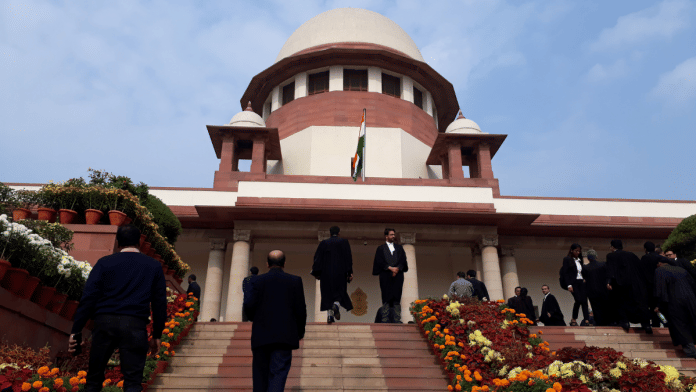New Delhi: In a significant judgment that is likely to impact gender-related cases, the Supreme Court Thursday ruled that courts should not suggest or encourage any steps towards compromise such as marriage or mediation between accused and complainant in cases of sexual offences.
A bench of justices A.M. Khanwilkar and S. Ravindra Bhat issued a slew of guidelines for courts to adhere to while passing bail orders in cases involving crimes against women.
The top court issued the order while setting aside a July 2020 order of the Madhya Pradesh High Court that released a man, accused of molestation, on the condition he would get a rakhi tied by the complainant.
The judgment came on a plea filed by nine women lawyers who contended that such bail orders have the effect of trivialising sexual offences. Assistance of Attorney General K.K. Venugopal was sought by the bench during the hearing.
On the high court judgment, the Supreme Court said “using rakhi tying as a condition for bail transforms a molester into a brother by a judicial mandate”.
According to the court, it is beyond any court’s jurisdiction and power to impose such a condition or even suggest a compromise in cases of this nature.
It said courts must avoid the use of phrases or expressions that reflect stereotypical or patriarchal notions about women and their place in society. Bail conditions, it added, must be in strict accordance with the requirements under the Criminal Procedure Code (CrPc).
“Judges especially should not use any words, spoken or written, that would undermine or shake the confidence of the survivor in the fairness or impartiality of the court,” the Supreme Court said.
Also read: ‘Will you marry her?’ — CJI Bobde asks govt servant accused of repeatedly raping minor
Guidelines for judges, lawyers to follow
In its judgment, the court passed seven key directions for courts to follow when bail orders are dictated.
“The act perpetrated on the survivor constitutes an offence in law, and is not a minor transgression that can be remedied by way of an apology, rendering community service, tying a rakhi or presenting a gift to the survivor,” the court said.
Among the key directions in the judgment are that bail conditions should not mandate or permit contact between accused and victim, should seek to protect the victim, not discuss the complainant’s behaviour, dress, past conduct or morals and the complainant should immediately be informed about the bail order.
The bench also said courts must desist from expressing any stereotype opinion about women, in words spoken during proceedings, or in the course of a judicial order.
Further, the top court said the expressions that should not find their way into any verdict include phrases such as “women are physically weak and need protection”, “women are incapable of or cannot take decisions on their own”, “men are the head of household and should take all decisions relating to family” and “good women are sexually chaste”.
The court went on to suggest training and sensitisation of judges and lawyers, including public prosecutors.
A module on gender sensitisation should be included as part of the foundational training of every judge. The module, the court added, must aim at imparting techniques for judges to be more sensitive in hearing and deciding cases of sexual assault, and eliminating entrenched social bias, especially misogyny.
It noted that gender violence is most often unseen and is shrouded in a culture of silence.
“The causes and factors of violence against women include entrenched unequal power equations between men and women that foster violence and its acceptability, aggravated by cultural and social norms, economic dependence, poverty and alcohol consumption, etc.,” the court said.
Also read: Woman’s consent can’t be implied from past experience with rape accused, says Delhi court






